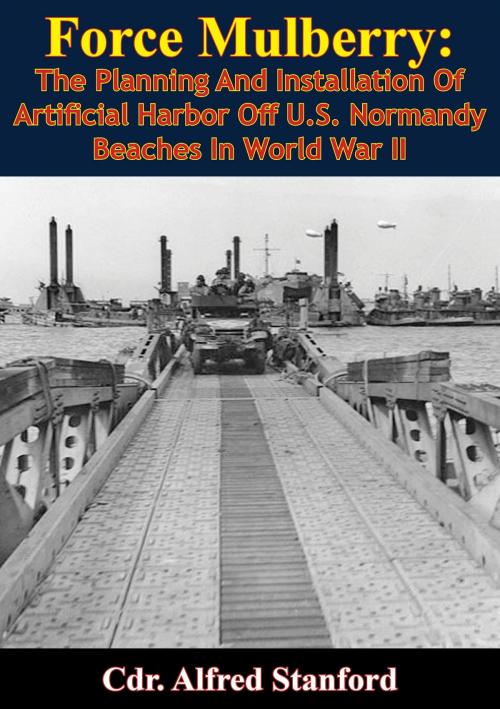Force Mulberry:
The Planning And Installation Of Artificial Harbor Off U.S. Normandy Beaches In World War II [Illustrated Edition]
Nonfiction, History, Germany, European General, Military, United States| Author: | Cdr. Alfred Stanford | ISBN: | 9781786258755 |
| Publisher: | Lucknow Books | Publication: | March 28, 2016 |
| Imprint: | Lucknow Books | Language: | English |
| Author: | Cdr. Alfred Stanford |
| ISBN: | 9781786258755 |
| Publisher: | Lucknow Books |
| Publication: | March 28, 2016 |
| Imprint: | Lucknow Books |
| Language: | English |
This edition contains numerous illustrations and maps.
“In this book Commander Stanford has made a very important contribution to the history of World War II, and in the writing of it he has recaptured the tense excitement, almost desperation, of planning and executing the landings in Normandy. The “Mulberries,” the two artificial harbors established immediately after the initial landings, were absolutely essential for the success of Operation Overlord. For, as we found out in World War II, the most difficult thing in an amphibious operation is not to establish the initial beachhead—that can almost always be done if sufficient force is employed and tactical surprise is obtained—but to sustain and reinforce the ground troops against the beachhead, and attain the objective.
“Massive as was the Anglo-American assault on the Normandy beaches, it had to be followed up immediately by even greater increments of men, armor, vehicles and supplies to make it succeed. There was no possibility of getting all this ashore over wave-lashed beaches where spring tides rose twenty-one feet. One or more ports were essential to maintain an even flow of men and matériel. But all the French ports, notably the nearest ones at Cherbourg and Le Havre, were so strongly held by the enemy that the capture of one would employ forces badly needed elsewhere for at least six weeks, during which the Germans would be unexpectedly weak or very stupid if they did not succeed in rubbing out the initial beachhead.
“The only possible way out of this dilemma was the apparently impossible task of providing sheltered water off the beaches within a matter of three days. Since speed was of the essence, all elements of the artificial harbors would have to be constructed in England, towed across the Channel under danger of wind, weather and enemy air attack, and sited under fire…”—Rear Admiral Samuel E. Morison
This edition contains numerous illustrations and maps.
“In this book Commander Stanford has made a very important contribution to the history of World War II, and in the writing of it he has recaptured the tense excitement, almost desperation, of planning and executing the landings in Normandy. The “Mulberries,” the two artificial harbors established immediately after the initial landings, were absolutely essential for the success of Operation Overlord. For, as we found out in World War II, the most difficult thing in an amphibious operation is not to establish the initial beachhead—that can almost always be done if sufficient force is employed and tactical surprise is obtained—but to sustain and reinforce the ground troops against the beachhead, and attain the objective.
“Massive as was the Anglo-American assault on the Normandy beaches, it had to be followed up immediately by even greater increments of men, armor, vehicles and supplies to make it succeed. There was no possibility of getting all this ashore over wave-lashed beaches where spring tides rose twenty-one feet. One or more ports were essential to maintain an even flow of men and matériel. But all the French ports, notably the nearest ones at Cherbourg and Le Havre, were so strongly held by the enemy that the capture of one would employ forces badly needed elsewhere for at least six weeks, during which the Germans would be unexpectedly weak or very stupid if they did not succeed in rubbing out the initial beachhead.
“The only possible way out of this dilemma was the apparently impossible task of providing sheltered water off the beaches within a matter of three days. Since speed was of the essence, all elements of the artificial harbors would have to be constructed in England, towed across the Channel under danger of wind, weather and enemy air attack, and sited under fire…”—Rear Admiral Samuel E. Morison



![Cover of the book St Lô (7 July - 19 July, 1944) [Illustrated Edition] by Cdr. Alfred Stanford](https://www.kuoky.com/images/2014/june/300x300/9781782892502-d54q_300x.jpg)
![Cover of the book The Martial Adventures Of Henry And Me [Illustrated Edition] by Cdr. Alfred Stanford](https://www.kuoky.com/images/2014/august/300x300/9781782893547-oYLm_300x.jpg)

![Cover of the book UTAH BEACH TO CHERBOURG - 6-27 JUNE 1944 [Illustrated Edition] by Cdr. Alfred Stanford](https://www.kuoky.com/images/2014/august/300x300/9781782892649-OpIQ_300x.jpg)
![Cover of the book Operation Neptune [Illustrated Edition] by Cdr. Alfred Stanford](https://www.kuoky.com/images/2016/november/300x300/9781787203297-mEI4_300x.jpg)


![Cover of the book From Mons To Loos - The Diary Of A Supply Officer [Illustrated Edition] by Cdr. Alfred Stanford](https://www.kuoky.com/images/2014/august/300x300/9781782894681-tsvI_300x.jpg)



![Cover of the book Robert Bacon — Life And Letters [Illustrated Edition] by Cdr. Alfred Stanford](https://www.kuoky.com/images/2014/june/300x300/9781782891710-redE_300x.jpg)
![Cover of the book The A.E.F. Of A Conscientious Subaltern [Illustrated Edition] by Cdr. Alfred Stanford](https://www.kuoky.com/images/2014/august/300x300/9781782892977-a5ly_300x.jpg)